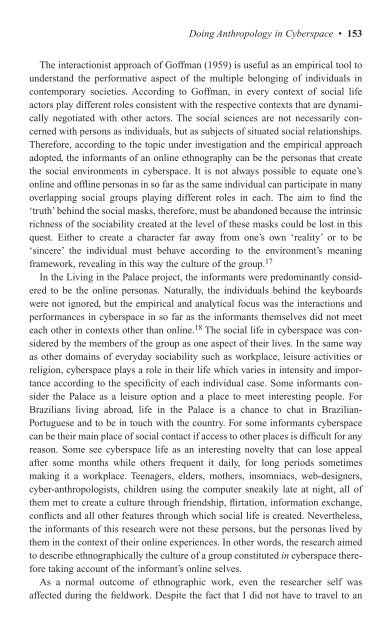Virtual Methods
Virtual Methods
Virtual Methods
Create successful ePaper yourself
Turn your PDF publications into a flip-book with our unique Google optimized e-Paper software.
Doing Anthropology in Cyberspace • 153<br />
The interactionist approach of Goffman (1959) is useful as an empirical tool to<br />
understand the performative aspect of the multiple belonging of individuals in<br />
contemporary societies. According to Goffman, in every context of social life<br />
actors play different roles consistent with the respective contexts that are dynamically<br />
negotiated with other actors. The social sciences are not necessarily concerned<br />
with persons as individuals, but as subjects of situated social relationships.<br />
Therefore, according to the topic under investigation and the empirical approach<br />
adopted, the informants of an online ethnography can be the personas that create<br />
the social environments in cyberspace. It is not always possible to equate one’s<br />
online and offline personas in so far as the same individual can participate in many<br />
overlapping social groups playing different roles in each. The aim to find the<br />
‘truth’ behind the social masks, therefore, must be abandoned because the intrinsic<br />
richness of the sociability created at the level of these masks could be lost in this<br />
quest. Either to create a character far away from one’s own ‘reality’ or to be<br />
‘sincere’ the individual must behave according to the environment’s meaning<br />
framework, revealing in this way the culture of the group. 17<br />
In the Living in the Palace project, the informants were predominantly considered<br />
to be the online personas. Naturally, the individuals behind the keyboards<br />
were not ignored, but the empirical and analytical focus was the interactions and<br />
performances in cyberspace in so far as the informants themselves did not meet<br />
each other in contexts other than online. 18 The social life in cyberspace was considered<br />
by the members of the group as one aspect of their lives. In the same way<br />
as other domains of everyday sociability such as workplace, leisure activities or<br />
religion, cyberspace plays a role in their life which varies in intensity and importance<br />
according to the specificity of each individual case. Some informants consider<br />
the Palace as a leisure option and a place to meet interesting people. For<br />
Brazilians living abroad, life in the Palace is a chance to chat in Brazilian-<br />
Portuguese and to be in touch with the country. For some informants cyberspace<br />
can be their main place of social contact if access to other places is difficult for any<br />
reason. Some see cyberspace life as an interesting novelty that can lose appeal<br />
after some months while others frequent it daily, for long periods sometimes<br />
making it a workplace. Teenagers, elders, mothers, insomniacs, web-designers,<br />
cyber-anthropologists, children using the computer sneakily late at night, all of<br />
them met to create a culture through friendship, flirtation, information exchange,<br />
conflicts and all other features through which social life is created. Nevertheless,<br />
the informants of this research were not these persons, but the personas lived by<br />
them in the context of their online experiences. In other words, the research aimed<br />
to describe ethnographically the culture of a group constituted in cyberspace therefore<br />
taking account of the informant’s online selves.<br />
As a normal outcome of ethnographic work, even the researcher self was<br />
affected during the fieldwork. Despite the fact that I did not have to travel to an



